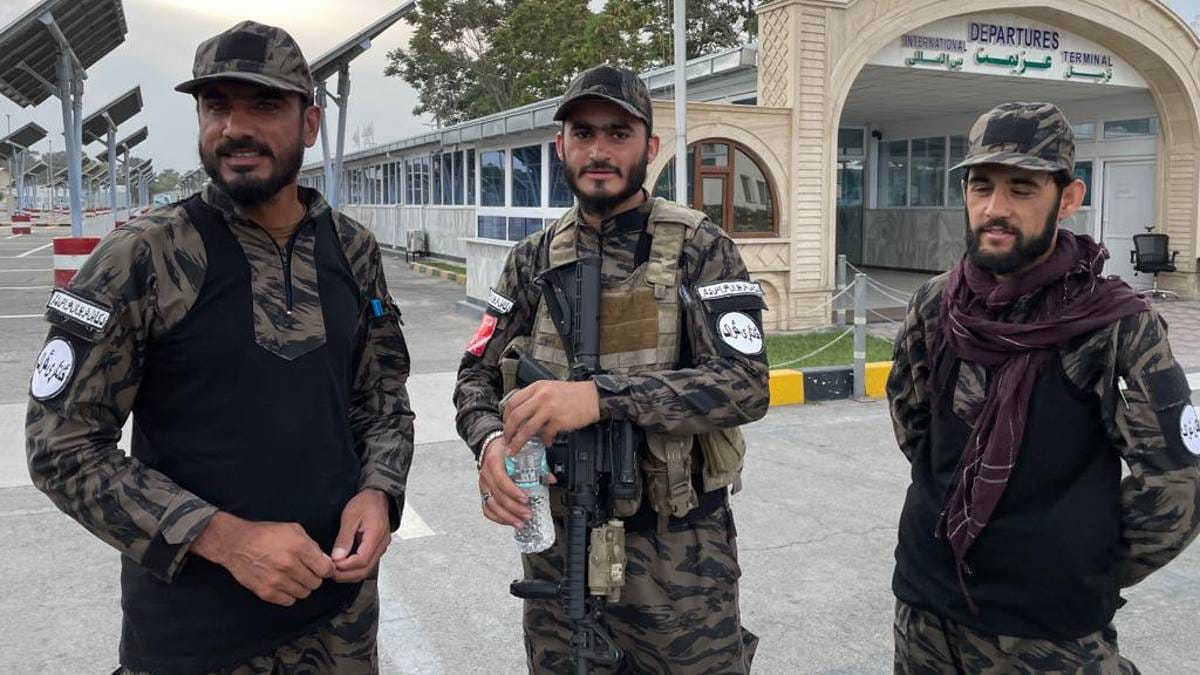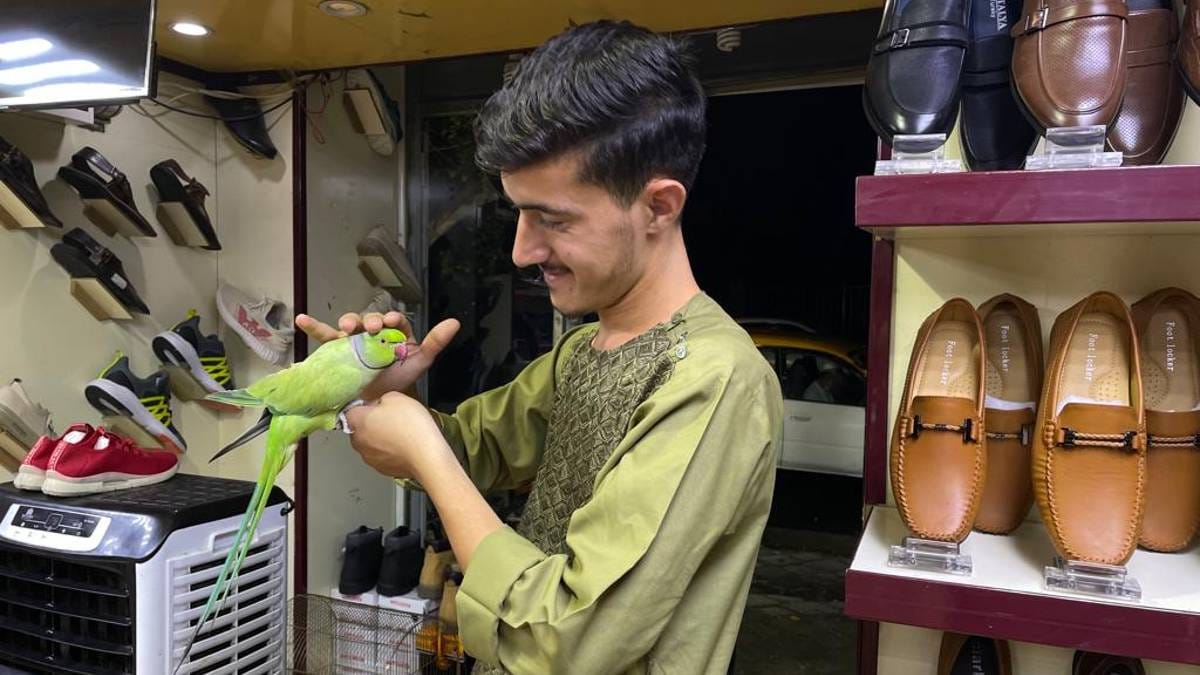Kabul: There was a hush at the Kabul International airport Thursday evening as the much-delayed Kam Air flight from Delhi disgorged its passengers, unloaded its enormous cargo and crawled back to the hangar. The passengers quickly walked to the parking lot on the other side of the airport, the men leading the women — some carefully clothed in pitch black, others more careless about the shimmery sequin patterns on their green burkha sleeves — past the three, young Taliban guards at the passenger entrance, past the white and black Islamic Emirate flag fluttering in the breeze, past the “I love Afghanistan” signpost opposite the main terminal building.
The airport no longer bears the names of two distinguished Afghan leaders — Ahmad Shah Massoud — the Tajik leader, whose brooding portrait reminded everyone of his assassination two days before the al Qaeda bombed America on 11 September, 2001 — and Hamid Karzai — the Pashtun leader, who refused to leave Kabul with his wife and three daughters on 15 August last year, when the Taliban walked into the capital without firing a shot.

The airport seems like a ghost version of itself, catering to a few flights and even fewer people.
The hush extends into the city.
Earlier in the evening, an Islamic State suicide squad burst into a seminary and killed a key Taliban ideologue, Rahimullah Haqqani.
The Taliban, admittedly, are nervous — this is their first anniversary week and they don’t want any hardline, extremist groups to spoil the party. Only a few days ago, the Americans brought Afghanistan back to the front pages of newspapers, when they plucked the senior-most al Qaeda leader Ayman al-Zawahiri from a balcony in the heart of Kabul, and killed him with a missile launched from a drone. Today, there’s enough Taliban with enough weapons at that crossing to prevent pesky journalists from taking photos, to make up a small armoury.
Shahr-e-Naw, literally, The New City, used to be a cauldron of noise and activity, the streets choked with cars, the pavements buzzing with people of all ages, shapes and sizes. It was like a fashion parade — Kabuli women strutting their tent-like outer garment known as the “chadaree” in colours anything but black, luxuriating in the confidence brought about by 20 years of education — while the fruit sellers and currency converters and restaurants did brisk business on the backs of lavish Western aid.
But this Kabul seems to have retreated into itself. An unseasonal shower that sends everyone running home adds to the feeling that something is missing. A young boy still caresses his pet parrot, Toti, in a shoe shop as he waits for the rain to ebb.
Further down the street, Chara-i-Ansari, or Chowk Ansari, Aimuddin’s shop still sells the best vanilla ice cream in all South Asia, as his muscular, fellow worker hand-grinds the ingredients in an aluminium ‘deg’ that is embedded in cubes of ice.

Also read: Taliban won’t give up al-Qaeda, not after US killing al-Zawahiri. Kabul’s a safe haven
‘Happy India has opened embassy in Kabul’
The sense of incompleteness had begun at the airport itself — the airport that has no particular name.
As we wait for our luggage at one of the two carousels, it’s heartening to note that the air-conditioning is running nicely. We ask one of the porters the cause for the luggage delay, and he turns around and says, “It’s because the cargo from Delhi has brought ‘paan’.”
Paan? Yes, paan (betel nut). He adds, “Like, khai-ke paan Banaraswallah,” a line from an old and much-loved Amitabh Bachhan starrer.
According to this porter, the cargo from Delhi, along with medicines and clothes and whatnot, also includes the betel nut. No one knows if this is true, but by now he has launched into another Hindi song of unknown vintage.
The luggage shows no signs of showing up.

A slim, young girl in nicely coordinated trousers and long tunic is standing close by, her non-resident Afghan look accentuated by an Australian accent. Afghanistan has changed so much. One sister left, evacuated, when the Taliban came to Kabul last year, and is now in the US. Another sister, recently married, refuses to leave the house. “They broke our hearts. The Taliban broke our hearts,” she said.
Meanwhile, the three young Taliban guards at the passenger entrance inside the airport, aged 21, 22 and 28 years — the older man once worked with the much-villified former president, Ashraf Ghani’s security — have no hesitation in speaking about Hindustan.

Hindustan is an old friend. We would like to revive communication with Hindustan. Pakistan and Iran are territorial neighbours and India is a bit far, but we will not allow our soil to be used by foreign countries against India, said one of them.
Back in Shahr-e-Naw, the Taliban and its mandate dominate the conversation.
Aimuddin is most eloquent. “The Americans destroyed the country. The Taliban are good for Afghanistan.”
Another young man at a burger joint pipes up in perfect English, “You cannot imagine what the Taliban can do to people.” A middle-aged Afghan-American, with several properties in the city, insists, “Afghanistan must be run by Afghans. Not by foreigners.”
Fazal Ahmad, a middle-aged Taliban gentleman from Kandahar, with four daughters — two working as doctors and the other two students — is escaping the rain at a shop which sells sweetmeats and birthday party paraphernalia made in China. He has been to India four times, twice for medical treatment.
“There is no need to be afraid of the Taliban. You can go where you like. We are happy that India has opened a “safarat”, an embassy, in Kabul. Right now it is small, it should be made bigger, so that Afghans can get visas to travel and Indians can come here,” he says.

The rain has eased. The Taliban leader makes his way home. The shopkeeper deals with a couple of late stragglers. Kabul is shutting down for the night, pushing its unresolved issues to another day.
(This is an updated version of the copy.)
(Edited by Poulomi Banerjee)
Also read: Hard-nosed, practical—why India has revived relations with Kabul, and why Taliban is welcoming






